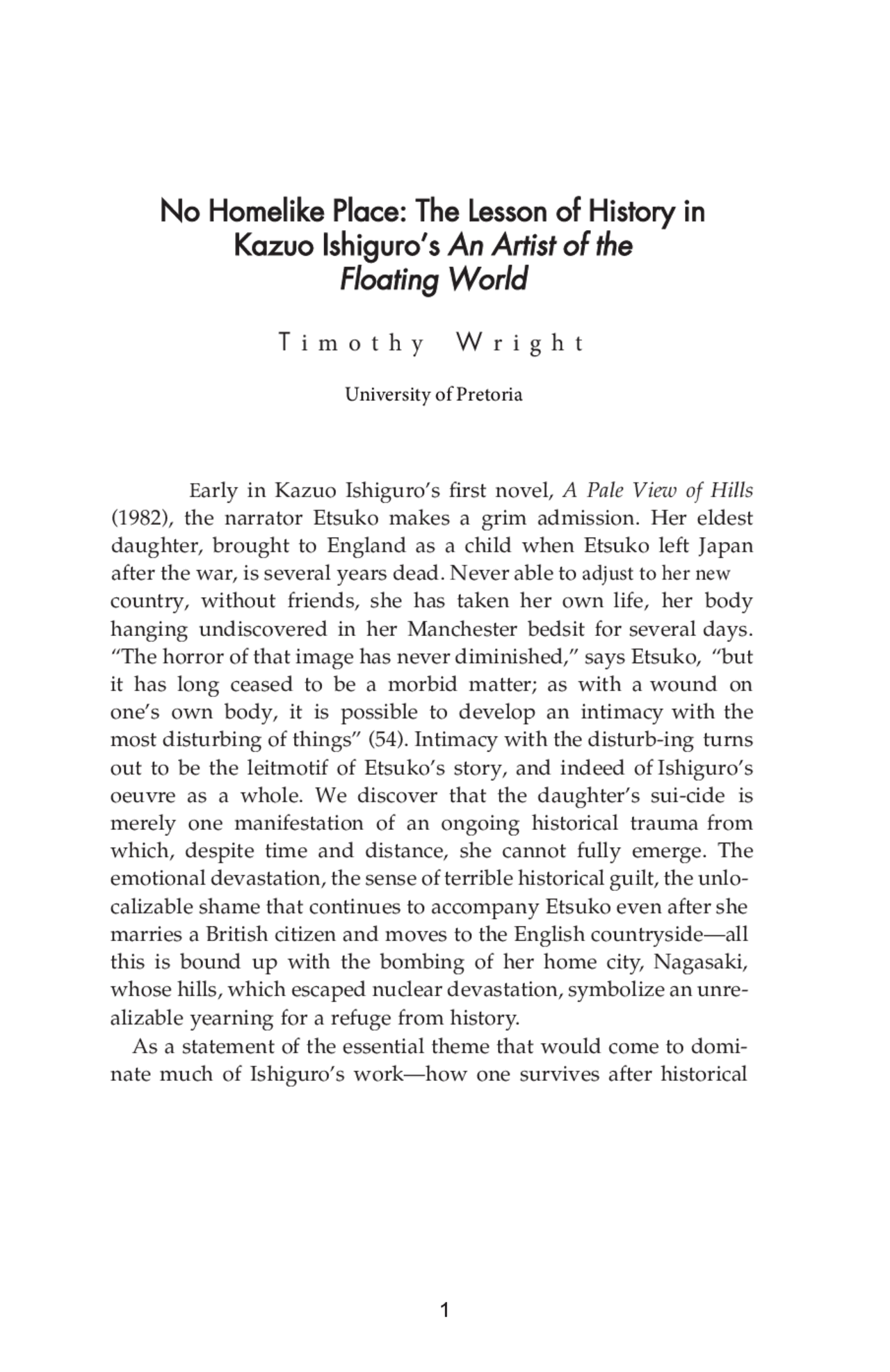The Role Of Memory And Forgetting In Kazuo Ishiguro's Fiction

Table of Contents
The Construction and Distortion of Memory
Ishiguro's characters frequently grapple with unreliable memories, their recollections fragmented and subjective. The past, for them, is not a stable entity but a malleable construct, influenced by trauma, repression, and the ever-shifting lens of self-perception. This unreliability extends to the narrative itself, often leaving the reader to piece together the truth from scattered fragments of memory. The resulting ambiguity compels us to question the nature of truth and the very act of remembering.
- Example from Never Let Me Go: Kathy's hazy memories of her childhood at Hailsham highlight the inherent unreliability of childhood recollections, particularly when shaped by a controlled and arguably artificial environment. The ambiguity surrounding Hailsham's true nature underscores the fragility and distortion inherent in memory.
- Example from The Remains of the Day: Stevens, the aging butler, demonstrates a profound selective memory, carefully curating his recollections to maintain a façade of unwavering professionalism and loyalty. His carefully constructed narrative masks deeper emotions and moral ambiguities, revealing the insidious power of self-deception fueled by memory distortion.
- Example from When We Were Orphans: Christopher Banks' narrative is riddled with gaps and uncertainties, reflecting the trauma of his fragmented childhood. His search for his parents is simultaneously a search for his own forgotten past, highlighting the intimate connection between memory and identity formation. This unreliable narration creates suspense and forces the reader to actively participate in reconstructing his past.
Forgetting as a Form of Self-Preservation
In Ishiguro's fiction, forgetting often acts as a crucial coping mechanism, a psychological defense against overwhelming pain and trauma. Characters suppress painful memories to protect their sense of self, their emotional equilibrium built upon a foundation of selective amnesia. This self-preservation, however, carries significant ethical implications, raising questions about the cost of avoiding painful truths.
- Stevens' repression of his feelings in The Remains of the Day, his unwavering commitment to duty masking a profound emotional repression, serves as a potent example of this self-preservation. His dedication to his profession prevents him from confronting the realities of his past and the personal sacrifices he made.
- The clones' acceptance of their fate in Never Let Me Go can be interpreted as a form of passive forgetting, a resignation born from the overwhelming reality of their predetermined lives. This acceptance, however, does not negate the inherent tragedy of their situation.
- The potential consequences of suppressing memories, whether it leads to psychological damage or a distorted understanding of self, are consistently explored across Ishiguro's works, highlighting the complexity of this defense mechanism.
Memory and Identity Formation
Memory plays a pivotal role in shaping the identities of Ishiguro's characters. Their understanding of the past, however flawed or incomplete, directly informs their present actions and choices. The loss or distortion of memory, therefore, profoundly impacts their sense of self, leading to feelings of alienation, confusion, and a desperate search for meaning.
- Kathy's struggle to define her identity in Never Let Me Go is inextricably linked to her fragmented memories of Hailsham and her relationships with other clones. The hazy nature of her past prevents her from fully grasping her own existence and purpose.
- Stevens' attempts to reconcile his past actions with his self-image in The Remains of the Day underscore the complex interplay between memory and identity. He struggles to reconcile his idealized self-image with the potentially flawed reality of his choices.
- Christopher Banks' quest to uncover his past in When We Were Orphans is driven by a desperate need to understand his own identity. His journey of self-discovery is a testament to the crucial role memory plays in defining who we are.
The Narrative Function of Memory and Forgetting
Ishiguro expertly uses memory and forgetting as fundamental narrative devices, constructing suspense and intrigue through the controlled release of information. The gradual revelation of memories shapes the reader’s understanding of the plot, creating a compelling narrative experience. The use of flashbacks and unreliable narration further emphasizes this technique, mirroring the fallible nature of human memory.
- The gradual unveiling of the clones' fate in Never Let Me Go keeps the reader engaged, the slow drip-feed of information heightening the emotional impact of the narrative.
- The fragmented memories presented throughout The Remains of the Day create a sense of mystery and suspense, forcing the reader to actively engage with the narrative to uncover the truth.
- The mystery surrounding Christopher Banks' past in When We Were Orphans drives the plot forward, creating intrigue and engaging the reader in the protagonist's quest for self-discovery.
Conclusion: The Enduring Power of Memory and Forgetting in Ishiguro's Work
In conclusion, the exploration of memory and forgetting is not merely a thematic element in Ishiguro's novels but a fundamental architect of his narrative style and character development. The unreliable nature of memory, its capacity for both self-preservation and self-destruction, shapes the lives and destinies of his characters profoundly. This masterful manipulation of memory and forgetting is what elevates Ishiguro's work, offering insightful commentary on identity, morality, and the enduring power of the past. To further appreciate the complex interplay of memory in Ishiguro's fiction, we encourage readers to engage with his novels and explore the rich tapestry of human experience woven through his exploration of forgetting. Further research into the psychological underpinnings of Ishiguro's narrative techniques could illuminate even more deeply the subtle and profound ways he uses memory and forgetting to craft his enduring stories.

Featured Posts
-
 1 5 Million Debt Repaid George Russells Financial Settlement And Its Impact On His F1 Career
May 25, 2025
1 5 Million Debt Repaid George Russells Financial Settlement And Its Impact On His F1 Career
May 25, 2025 -
 A Fungi Threat Rising Temperatures And Internal Infections
May 25, 2025
A Fungi Threat Rising Temperatures And Internal Infections
May 25, 2025 -
 Carlos Alcaraz And Aryna Sabalenka Triumph At Italian Open
May 25, 2025
Carlos Alcaraz And Aryna Sabalenka Triumph At Italian Open
May 25, 2025 -
 Carolina Country Music Fest 2025 Sells Out What To Expect Next Year
May 25, 2025
Carolina Country Music Fest 2025 Sells Out What To Expect Next Year
May 25, 2025 -
 Porsche 956 Nin Tavan Asili Sergileme Yoentemi
May 25, 2025
Porsche 956 Nin Tavan Asili Sergileme Yoentemi
May 25, 2025
